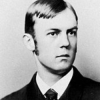Charles Horton Cooley

Charles Horton Cooley
Charles Horton Cooleywas an American sociologist and the son of Thomas M. Cooley. He studied and went on to teach economics and sociology at the University of Michigan, and he was a founding member and the eighth president of the American Sociological Association. He is perhaps best known for his concept of the looking glass self, which is the concept that a person's self grows out of society's interpersonal interactions and the perceptions of others...
NationalityAmerican
ProfessionSociologist
CountryUnited States of America
men artist desire
To desire to be an artist is to desire to be a complete man in respect to some one function, to realize yourself utterly. A man is a poor thing who is content not to be an artist.
country hands class
Between richer and poorer classes in a free country a mutually respecting antagonism is much healthier than pity on the one hand and dependence on the other, as is, perhaps, the next best thing to fraternal feeling.
ideas self mind
The social self is simply any idea, or system of ideas, drawn from the communicative life, that the mind cherishes as its own.
men individuality bread
Each man must have his I; it is more necessary to him than bread.
games care conflict
When one ceases from conflict, whether because he has won, because he has lost, or because he cares no more for the game, the virtue passes out of him.
government church needs
Institutions - government, churches, industries, and the like - have properly no other function than to contribute to human freedom; and in so far as they fail, on the whole, to perform this function, they are wrong and need reconstruction.
art anger order
Our individual lives cannot, generally, be works of art unless the social order is also.
life-and-love fall humanity
Failure sometimes enlarges the spirit. You have to fall back upon humanity and God.
retirement mean successful
It happens from time to time in every complex and active society, that certain persons feel the complexity and insistence as a tangle, and seek freedom in retirement, as Thoreau sought at Walden Pond. They do not, however, in this manner escape from the social institutions of their time, nor do they really mean to do so; what they gain, if they are successful, is a saner relation to them.
suicide art writing
One should never criticize his own work except in a fresh and hopeful mood. The self-criticism of a tired mind is suicide.
issues mind obscurity
The human mind is indeed a cave swarming with strange forms of life, most of them unconscious and unilluminated. Unless we can understand something as to how the motives that issue from this obscurity are generated, we can hardly hope to foresee or control them.
self giving feelings
If love closes, the self contracts and hardens: the mind having nothing else to occupy its attention and give it that change and renewal it requires, busies itself more and more with self-feeling, which takes on narrow and disgusting forms, like avarice, arrogance and fatuity.
eye reflection water
As social beings we live with our eyes upon our reflection, but have no assurance of the tranquillity of the waters in which we see it.
freedom men soul
No matter what a man does, he is not fully sane or human unless there is a spirit of freedom in him, a soul unconfined by purpose and larger than the practicable world.